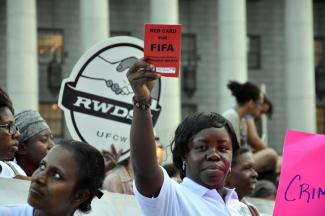Migration
Touchy issue

For more than a decade, international organisations have been pointing out that migration can support development. Political discourse in destination countries, however, mostly sees migration as a problem.
Different viewpoints became apparent once more at the annual meeting of the Global Forum on Migration and Development (GFMD), which was held in Sweden in May. The GFMD is a voluntary, non-binding series of conferences outside the UN system. Governments, international organisations and civil society are involved in the GFMD.
Different parties have different ideas concerning the impact of migration on development. Some argue that remittances – the money migrants earn abroad and then send home to their families – could contribute substantially to developing the countries of origin. Others point out, however, that one cannot simply use private money for development plans, and that the costs of migration must be considered as well.
There is also disagreement about the respective roles of the International Labour Organisation (ILO), a UN agency, and the International Organisation for Migration (IOM), which was established outside the UN.
Many of the migrants’ organisations that participate in the GFMD want to strengthen the ILO, because it is relatively transparent and has a tripartite structure involving states, employers and trade unions. The ILO, moreover, promotes workers’ rights. For instance, migrants benefit from the legally binding ILO Convention on Decent Work for Domestic Workers (see D+C/E+Z 2010/7–8, p. 307). The governments of destination countries, however, favour the IOM because, due to their financial contributions, they wield greater influence in its context.
This year’s GFMD remained rather vague on the humanitarian crisis concerning refugees on the borders of the EU (note comment by Samir Abi on p. 261). However, migrants who, having been displaced by violence or natural disasters, end up stuck in a transit country, have reason to hope for more support. At the moment, some 600,000 to 700,000 refugees are living in Turkey, for instance. Awareness of transit countries being unable to cope with the issues on their own is growing internationally. Turkey will host next year’s GFMD.
The GFMD is a result of the first UN High-Level Dialogue on Migration and Development in 2006. Migrants’ organisations have increasingly managed to raise their voices to express their demands in this context. In 2006, issues such as the rights of migrants or the fate of migrants without valid documents were largely ignored. In 2013, however, they were on the agenda of the second High-Level Dialogue.
Continuous civil-society activism inside and outside the GFMD helped to make that happen. The Global Coalition on Migration (GCM), which is an umbrella body for migrants’ organisations, trade unions, faith-based organisations and scholars, has become an important force in this context. Its demands include:
- more stringent regulation of recruitment agencies and other parties that profit from the migration business,
- the specific rights of migrant women, including domestic workers, and
- fundamental labour rights for migrants.
These issues are taken seriously now. Discussions have become more polite, and the debate has become more open. Nonetheless, positions taken by different sides – civil-society activists, international organisations, private-sector lobbies and the governments of destination countries, transit countries and countries of origin – still seem incompatible. The participants in Stockholm agreed however, that migration must be on the post-2015 agenda for global development after having been neglected in the Millennium Development Goals.
Stefan Rother







